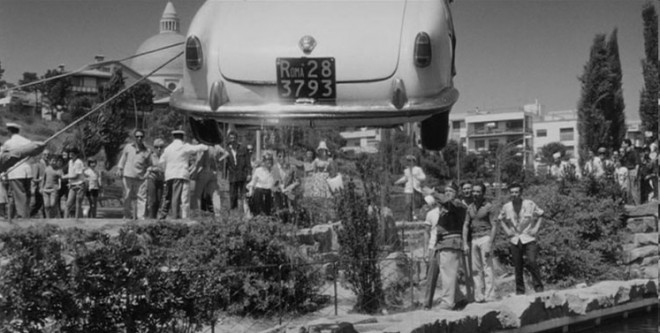Delicate and exquisite, Une aussi longue absence, Henri Colpi’s first film as director (Colpi edited Alain Resnais’ Hiroshima, mon amour, 1959, and Last Year at Marienbad, 1961), is a dream of a film. From France and Italy, written by Marguerite Düras and Gérard Jarlot, it shared the top prize at Cannes with Luis Buñuel’s Viridiana. In addition, it won the Prix Louis Delluc and two Kinema Junpo Awards, for best foreign-language film and for Colpi’s filmmaking. It is a film, then, that the world once loved, but one that would become largely, mysteriously forgotten.
Alida Valli is brilliant as Thérèse Langlois, who runs a seaside working-class café in a Paris suburb; Thérèse calls the small place “home.” When a tramp appears in her vicinity, Thérèse seizes upon the notion that this amnesiac is her “missing” husband, who failed to return home from enemy captivity at the end of the Second World War sixteen years earlier. Thérèse Langlois won’t let go.
The opening shot is magnificent. The screen is blackened out as a plaintive song about the new day is sung, softly, in a male voice. The “black” is revealed to belong to the back of the tramp’s shabby coat, in closeup, as he heads out into the new day. It is he who is singing. Before Thérèse has even been introduced, we are given this projection of hers. The tramp’s back suggests her backward look; the darkness of it suggests the mystery of her husband’s absence which she hopes ro penetrate. The song? Thérèse’s hope to begin a new day—with her lost love back in her arms. We must be patient; as we proceed through this sensitive, beautiful film, out of the darkness of Thérèse’s inconclusive past, the meaning of the opening shot, complete with its visual punning, becomes clear to us.
Thérèse’s husband’s family raises doubts from the get-go that this tramp is who she so wants to believe it is. As I said, she won’t let go. Is she deluded, or full of faith?—or full of guilt, for being in a new life, a new relationship and having forgotten her former life, her avowed past bliss? Is the tramp’s amnesia a projection, or a mimicry, of her own?
Gently, carefully, Thérèse attempts to jog the tramp’s memory. The two dine together and dance together. It is summer, and the tramp leaves. Come winter, Thérèse assures herself, he will return. But the patches of black surrounding her at the end—blobs of delusion—suggest that he won’t. Right now, and perhaps forever, her head is more in the past than in the present: more hangover—mental shrapnel—from the war.
Georges Wilson plays the tramp.
B(U)Y THE BOOK
MY BOOK, A Short Chronology of World Cinema, IS CURRENTLY AVAILABLE FROM THE SANDS FILMS CINEMA CLUB IN LONDON. USING EITHER OF THE LINKS BELOW, ACCESS THE ADVERTISEMENT FOR THIS BOOK, FROM WHICH YOU CAN ORDER ONE OR MORE COPIES OF IT. THANKS.
